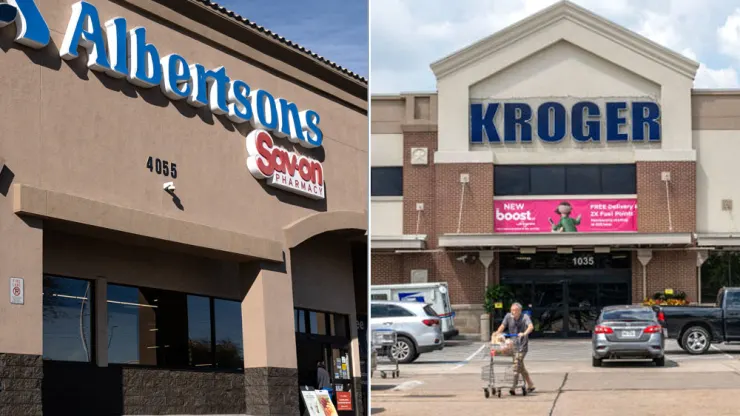The battle over whether grocery giants Kroger and Albertsons should be allowed to combine is heating up.
On Tuesday, leaders of the two companies defended their proposed merger at a congressional hearing in Washington, where they faced a series of questions about how the deal could shake up the competitive landscape — and potentially the prices that consumers pay at the store.
“I just don’t see less competition going forward,” Kroger CEO Rodney McMullen said at the hearing by the Senate Judiciary Subcommittee on Competition Policy, Antitrust, and Consumer Rights. “It’s easy for customers to make a right turn or a left turn.”
Kroger announced plans in October to acquire Albertsons in a deal valued at $24.6 billion. The Cincinnati-based company is the second-largest grocer by market share in the United States, behind Walmart, and Albertsons is fourth, after Costco, according to market researcher Numerator. Together, Kroger and Albertsons would be a closer second to Walmart.
At the hearing Tuesday, McMullen said that the combined company could help lower food prices and improve the customer experience, especially at a time when grocers are racing to adapt to changes like online shopping. He said retailers have to keep reinventing themselves to stay relevant and convince customers to drive to their stores.
Yet the proposed merger has faced intense pushback from elected officials of both political parties and opposition from the United Food and Commercial Workers, a major grocery union that represents thousands of the grocers’ employees.
Sen. Amy Klobuchar, a Democrat from Minnesota, led the hearing Tuesday along with Sen. Mike Lee, a Republican from Utah. Both challenged the companies on their actions, including Kroger’s $1 billion in share buybacks announced last year and plans to pay dividends to shareholders as well as previous deals, such as Albertsons’ acquisition of Safeway.
They emphasized that the proposed deal comes at a time when groceries are taking up more of American families’ budgets. Food prices have surged as inflation hovers near four-decade highs. Prices of everyday items, including butter, eggs, poultry and milk have jumped by double-digits from the year-ago period as of October, according to the most recent federal data available.
Skeptical senators, workers
The hearing offers a preview of the bigger antitrust battle ahead.
For Kroger and Albertsons, the argument is clear: combining will help them weather dramatic industry changes. Online grocery sales are eating into already thin margins. New players, such as deep discounters like Aldi and e-commerce players like Amazon, are also pressuring traditional grocers.
“The marketplace for groceries over the past decade has completely transformed making the competition for consumers fierce,” said Albertsons CEO Vivek Sankaran said at the hearing. “The best way to compete with mega stores like Walmart and highly capitalized online companies like Amazon will be through a merger with Kroger.”
He argued that even as a combined company, Kroger and Albertsons will still be small compared to Walmart, Costco and Amazon.
Ahead of the hearing, members of the UCFW — which represents over 100,000 Kroger and Albertsons workers — shared their worries at a press conference on Capitol Hill. Their concerns ranged from the potential loss of their pension plans to higher food prices to job losses.
Albertsons employees who belong to the union remembered the impact of past mergers. Judy Wood, a longtime cake decorator for the grocery giant, said she and her coworkers were shocked by the store closures that resulted after Safeway’s merger with Albertsons, which was announced in 2014.
Union members also railed against the private equity firms that will benefit from the proposed $4 per share special dividend for Albertsons shareholders announced in conjunction with the deal. Cerberus Capital Management owns a 28.4% stake in Albertsons, according to Factset. For now, the dividend payout is on hold until at least Dec. 9 due to a ruling in Washington state court.
McMullen said on Tuesday that the company does not plan to close stores or lay off employees, but said it will work with the Federal Trade Commission, if needed, to spin off stores for competitive reasons.
As part of its original proposal, Kroger said it already had a plan to overcome concerns about the merger − divesting between 100 and 375 stores in a spinoff. Kroger and Albertsons would work together — and with the FTC — to decide which stores would be part of the spinoff company.
On Tuesday, McMullen said the company is in “active conversations” with unions about the deal and what it means for its workforce. He said the deal would ultimately expand opportunities for employees. Kroger will also spend $1 billion on higher wages and better benefits for store employees after the deal closes, he said.
“A successful business is what creates his job security,” he said. “And we believe we’ll have an incredibly successful business that creates job security.”
Some grocery competitors and industry experts also opposed the deal at the hearing.
Michael Needler, chief executive officer of Fresh Encounter, an independent grocery chain based in Northwest Ohio, said companies like Walmart and Amazon use their size to pressure suppliers for lower prices and better terms. Instead of creating an even playing field, he said, the Kroger-Albertsons deal would create yet another power player who makes it difficult — if not impossible — for smaller grocers to compete.
For instance, he said, larger grocers have run predatory campaigns against his own chain by offering coupons for free groceries.
“I don’t know any other way to point out predatory pricing than buying your competition,” he said.
Sumit Sharma, a senior researcher who specializes in antitrust matters and competition at Consumer Reports, also said at the hearing that he does not see any benefits to combining the companies. Instead, he said retailers would have less reason to increase employee wages. Shoppers would have fewer choices and more sticker shock.
“Even if they sell a few stores, that is going to take competition out of the market,” he said. “So prices will go up.”

